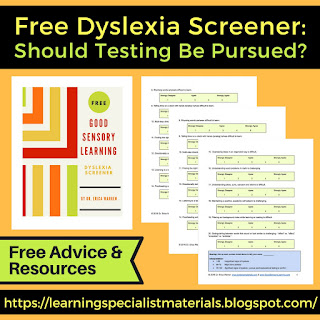This week I wanted to tell you about my online store, Good Sensory Learning. I’m Dr. Erica Warren, and I established this site so I could share all the materials that I have created over the last 20+ years as a learning specialist and educational therapist. When I first began my private practice, Learning to Learn, I had great difficulty finding fun and multisensory materials for my students that were effective and engaging. So back in 2005, I made it my mission to design and distribute high-end, remedial products as well as memorable, motivating lessons that bring delight to learning. If you would like to try a free sampling of my activities , CLICK HERE . How Are the Products Organized at Good Sensory Learning? You can download my Free Printable Catalog or you can browse the site using the grey “search all products” bar in the top right of any page with keywords such as dyslexia, working memory, and executive functioning. What’s more, drop down menus in the red banner allow you t...
Getting the best reasonable accommodations for struggling learners with disabilities can be a challenge. The list of possible options is rarely made available to parents, so many remain unaware of the diverse options. The first step is the understand the difference between reasonable accommodations and modifications.
Accommodations vs. Modifications?The United States clumps accommodations and modifications under the term reasonable accommodations, but other countries, such as Canada make a distinction between the two. An accommodation describes an alteration of the environment, curriculum format, or equipment that allows an individual with a disability to gain access to content and/or complete assigned tasks. Since accommodations do not alter what is being taught, instructors should be able to implement the same grading scale. Some examples of accommodations include: preferential seating, audiobooks, and speech to text technology. A modification describes a change in the curriculum. Modifications are made for students with disabilities who are unable to comprehend the content. For example, assignments might be simplified, or a student might receive a foreign language exemption. Some reasonable accommodations are difficult to discriminate and teeter between an accommodation and modification. For example, small group or individualized instruction could be an accommodation or a modification. It all depends on whether the expectations or curriculum is modified.
Who can Initiate Reasonable Accommodations?
Any student with a qualified disability or their legal guardian/parent can request a meeting that can result in reasonable accommodations. Please note that the disability must be documented by the school or an outside source and the results must be presented at the meeting.
What are Some Common Reasonable Accommodations?
Here is a list of general options. However, it will be your school's special education committee that decides which options will provide the necessary accommodations.
Difficulty
|
Accommodations/Modifications
|
Overall Teaching Techniques
|
|
Reading/
Listening
|
|
Spelling
|
|
Writing
|
|
Math
|
|
Test-taking
|
|
What if the Student Has Never Been Tested and You Suspect a Learning Disability?
The first thing you can do is complete my FREE screeners to see if there are notable symptoms of dyslexia or executive functioning problems.

The Free Good Sensory Learning Dyslexia Screener

The Free Good Sensory Learning Dyslexia Screener
I created the Good Sensory Learning Dyslexia Screener based on my comprehensive, doctoral training, an extensive literature review, and over 25 years working one to one with dyslexic learners. This 20-question screener offers a simple, Likert scale that addresses all the common symptoms. It is an informal evaluation and is best used to indicate whether formal testing should be pursued. Click Here to download your free copy today.
The Free Executive Functioning Screener
 The new Good Sensory Executive Functioning Screener is a free, 20 question assessment that can help parents, teachers, and professionals quick uncover the likelihood of executive functioning challenges. Individual items also reveal specific difficulties that require attention. To get your free copy, CLICK HERE
The new Good Sensory Executive Functioning Screener is a free, 20 question assessment that can help parents, teachers, and professionals quick uncover the likelihood of executive functioning challenges. Individual items also reveal specific difficulties that require attention. To get your free copy, CLICK HERE
What's Next?
Contact your school and ask them about their process for requesting the testing needed to evaluate for learning disabilities. If the results from the screeners above indicate any issues, be sure to share this information with them.
 The new Good Sensory Executive Functioning Screener is a free, 20 question assessment that can help parents, teachers, and professionals quick uncover the likelihood of executive functioning challenges. Individual items also reveal specific difficulties that require attention. To get your free copy, CLICK HERE
The new Good Sensory Executive Functioning Screener is a free, 20 question assessment that can help parents, teachers, and professionals quick uncover the likelihood of executive functioning challenges. Individual items also reveal specific difficulties that require attention. To get your free copy, CLICK HEREWhat's Next?
Contact your school and ask them about their process for requesting the testing needed to evaluate for learning disabilities. If the results from the screeners above indicate any issues, be sure to share this information with them.
Cheers, Dr. Erica Warren
Dr. Erica Warren is the author, illustrator, and publisher of multisensory educational materials at Good Sensory Learning and Dyslexia Materials. She is also the director of Learning to Learn and Learning Specialist Courses.
· Blog: https://learningspecialistmaterials.blogspot.com/
· YouTube Channel: https://www.youtube.com/user/warrenerica1
· Podcast: https://godyslexia.com/
· Store: http://www.Goodsensorylearning.com/ & www.dyslexiamaterials.com
· Courses: http://www.learningspecialistcourses.com/
· Newsletter Sign-up: https://app.convertkit.com/landing_pages/69400
· Blog: https://learningspecialistmaterials.blogspot.com/
· YouTube Channel: https://www.youtube.com/user/warrenerica1
· Podcast: https://godyslexia.com/
· Store: http://www.Goodsensorylearning.com/ & www.dyslexiamaterials.com
· Courses: http://www.learningspecialistcourses.com/
· Newsletter Sign-up: https://app.convertkit.com/landing_pages/69400


Comments
Post a Comment